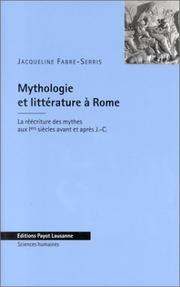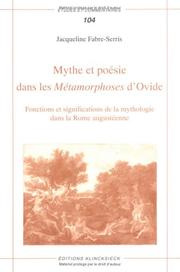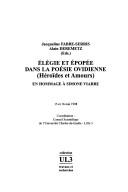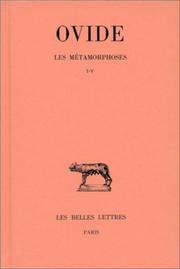| Listing 1 - 10 of 20 | << page >> |
Sort by
|
Book
ISBN: 9782757400340 2757400347 Year: 2008 Volume: *4 Publisher: Villeneuve-d'Ascq Presses universitaires du Septentrion
Abstract | Keywords | Export | Availability | Bookmark
 Loading...
Loading...Choose an application
- Reference Manager
- EndNote
- RefWorks (Direct export to RefWorks)
Latin literature --- Mythology, Classical, in literature. --- Arcadia in literature. --- Argonauts (Greek mythology) in literature. --- Littérature latine --- Mythologie ancienne dans la littérature --- Arcadie dans la littérature --- Argonautes (Mythologie grecque) dans la littérature --- History and criticism. --- Histoire et critique --- Mythology, classical, in literature --- Arcadia in literature --- Argonauts (Greek mythology) in literature --- History and criticism --- Littérature latine --- Mythologie ancienne dans la littérature --- Arcadie dans la littérature --- Argonautes (Mythologie grecque) dans la littérature --- Latin literature - History and criticism

ISBN: 2601032286 9782601032284 Year: 1998 Publisher: Lausanne Payot
Abstract | Keywords | Export | Availability | Bookmark
 Loading...
Loading...Choose an application
- Reference Manager
- EndNote
- RefWorks (Direct export to RefWorks)
Mythology, Roman, in literature --- Gods, Roman, in literature --- Latin literature --- Mythologie romaine dans la littérature --- Dieux romains dans la littérature --- Littérature latine --- Mythology, classical, in literature --- Gods, Greek, in literature --- History and criticism --- Rome --- Religion --- -Mythology, Classical, in literature --- Roman literature --- Classical literature --- Classical philology --- Latin philology --- Religion. --- Mythologie romaine dans la littérature --- Dieux romains dans la littérature --- Littérature latine --- Mythology, Classical, in literature --- Latin literature - History and criticism --- Rome - Religion

ISBN: 2252029927 9782252029923 Year: 1995 Volume: 104. Publisher: Paris : C. Klincksieck,
Abstract | Keywords | Export | Availability | Bookmark
 Loading...
Loading...Choose an application
- Reference Manager
- EndNote
- RefWorks (Direct export to RefWorks)
Latin poetry --- Politics and literature --- Mythology, Classical, in literature --- Mythology, Roman, in literature --- Metamorphosis in literature --- Erotic poetry, Latin --- Poésie latine --- Politique et littérature --- Mythologie ancienne dans la littérature --- Mythologie romaine dans la littérature --- Métamorphose dans la littérature --- Poésie érotique latine --- History and criticism --- Histoire et critique --- Ovid, --- Rome --- Rome dans la littérature --- In literature --- Ovide, --- Métamorphoses --- --Mythologie romaine --- --Ier s., --- Fables, Latin --- Mythology, classical, in literature --- -Latin fables --- Ovid --- In literature. --- Mythology, Classical, in literature. --- Mythology, Roman, in literature. --- Metamorphosis in literature. --- Poésie religieuse latine --- Mythologie ancienne dans la littérature. --- Mythologie romaine dans la littérature. --- Métamorphose dans la littérature. --- Rome dans la littérature. --- Metamorphoses (Ovidius) --- Mythen. --- Mythologie classique --- Mythos. --- Mythologie. --- Fables, Latin. --- Literature. --- Poésie religieuse latine - Histoire et critique. --- History and criticism. --- Histoire et critique. --- Dans la littérature. --- 43 B.C.-17 or 18 A.D --- Metamorphoses --- Ovide (0043 av. J.-C.-0017). --- Ovidius Naso, Publius. --- Ovide <43 av. J.-C.-17 ou 18> / Metamorphoseis. --- Ovidius Naso, Publius, --- Critique et interprétation. --- Metamorphoses (Ovid). --- Rome (Empire). --- -History and criticism --- Ovide --- Metamorphoses (Ovidius). --- Metamorphoses. --- Poésie latine --- Politique et littérature --- Mythologie ancienne dans la littérature --- Mythologie romaine dans la littérature --- Métamorphose dans la littérature --- Poésie érotique latine --- Rome dans la littérature --- Mythologie romaine --- Ier s., 1-100 --- Fables, Latin - History and criticism --- Ovid, - 43 BC-17 AD or 18 AD - Metamorphoses --- Ovide, 43 av JC-18 --- Rome - In literature
Article
Abstract | Keywords | Export | Availability | Bookmark
 Loading...
Loading...Choose an application
- Reference Manager
- EndNote
- RefWorks (Direct export to RefWorks)
Book
ISBN: 9781421417622 1421417626 9781421417639 1421417634 Year: 2015 Publisher: Baltimore
Abstract | Keywords | Export | Availability | Bookmark
 Loading...
Loading...Choose an application
- Reference Manager
- EndNote
- RefWorks (Direct export to RefWorks)
The martial virtues—courage, loyalty, cunning, and strength—were central to male identity in the ancient world, and antique literature is replete with depictions of men cultivating and exercising these virtues on the battlefield. In Women and War in Antiquity, sixteen scholars reexamine classical sources to uncover the complex but hitherto unexplored relationship between women and war in ancient Greece and Rome. They reveal that women played a much more active role in battle than previously assumed, embodying martial virtues in both real and mythological combat.The essays in the collection, taken from the first meeting of the European Research Network on Gender Studies in Antiquity, approach the topic from philological, historical, and material culture perspectives. The contributors examine discussions of women and war in works that span the ancient canon, from Homer's epics and the major tragedies in Greece to Seneca's stoic writings in first-century Rome. They consider a vast panorama of scenes in which women are portrayed as spectators, critics, victims, causes, and beneficiaries of war.This deft volume, which ultimately challenges the conventional scholarly opposition of standards of masculinity and femininity, will appeal to scholars and students of the classical world, European warfare, and gender studies.
War and society. --- Women. --- Women and war. --- Women soldiers. --- Women and war --- Women --- Women soldiers --- War and society --- Femmes et guerre --- Femmes --- Guerre et société --- History. --- Histoire --- Greece. --- Rome (Empire) --- Greece --- Rome --- Grèce --- History, Military. --- Histoire militaire --- Femmes militaires --- History --- Gender Studies & Sexuality --- Gender & Ethnic Studies --- Social Sciences --- Women as soldiers --- Women in the military --- Soldiers --- War and women --- War --- Women and the military --- Society and war --- Sociology --- Civilians in war --- Sociology, Military --- Social aspects --- E-books --- Guerre et société --- Grèce --- Women and war - Greece - History. --- Women and war - Rome - History. --- Women - Greece - History. --- Women - Rome - History. --- Women soldiers - Greece - History. --- Women soldiers - Rome - History. --- War and society - Greece - History. --- War and society - Rome - History. --- Greece - History, Military. --- Rome - History, Military.

ISBN: 2844670040 9782844670045 Year: 1999 Publisher: Villeneuve d'Ascq Université Charles de Gaulle - Lille III
Abstract | Keywords | Export | Availability | Bookmark
 Loading...
Loading...Choose an application
- Reference Manager
- EndNote
- RefWorks (Direct export to RefWorks)

ISBN: 2251011226 9782251011226 Year: 1994 Publisher: Paris : Les Belles lettres,
Abstract | Keywords | Export | Availability | Bookmark
 Loading...
Loading...Choose an application
- Reference Manager
- EndNote
- RefWorks (Direct export to RefWorks)
Book
ISBN: 3110719940 9783110719949 9783110719857 Year: 2021 Publisher: Berlin Boston
Abstract | Keywords | Export | Availability | Bookmark
 Loading...
Loading...Choose an application
- Reference Manager
- EndNote
- RefWorks (Direct export to RefWorks)
The question of 'identity' arises for any individual or ethnic group when they come into contact with a stranger or another people. Such contact results in the self-conscious identification of ways of life, customs, traditions, and other forms of society as one's own specific cultural features and the construction of others as characteristic of peoples from more or less distant lands, described as very 'different'. Since all societies are structured by the division between the sexes in every field of public and private activity, the modern concept of 'gender' is a key comparator to be considered when investigating how the concepts of identity and ethnicity are articulated in the evaluation of the norms and values of other cultures. The object of this book is to analyze, at the beginning Western culture, various examples of the ways the Greeks and Romans deployed these three parameters in the definition of their identity, both cultural and gendered, by reference to their neighbours and foreign nations at different times in their history. This study also aims to enrich contemporary debates by showing that we have yet to learn from the ancients' discussions of social and cultural issues that are still relevant today.
HISTORY / Ancient / General. --- antiquity. --- ethnicity. --- gender. --- identity. --- Race relations. --- Sex role. --- Integration, Racial --- Race problems --- Race question --- Relations, Race --- Ethnology --- Social problems --- Sociology --- Ethnic relations --- Minorities --- Racism --- Gender role --- Sex (Psychology) --- Sex differences (Psychology) --- Social role --- Gender expression --- Sexism --- Race relations --- Sex role --- E-books --- Gender roles --- Gendered role --- Gendered roles --- Role, Gender --- Role, Gendered --- Role, Sex --- Roles, Gender --- Roles, Gendered --- Roles, Sex --- Sex roles --- Ethnicity --- Ethnicité --- Relations interethniques --- Civilisation classique. --- History
Book
ISBN: 9783111340944 Year: 2023 Publisher: Berlin Boston
Abstract | Keywords | Export | Availability | Bookmark
 Loading...
Loading...Choose an application
- Reference Manager
- EndNote
- RefWorks (Direct export to RefWorks)
Book
ISBN: 3111340945 3111340791 9783111340944 Year: 2024 Publisher: Berlin : Walter de Gruyter GmbH
Abstract | Keywords | Export | Availability | Bookmark
 Loading...
Loading...Choose an application
- Reference Manager
- EndNote
- RefWorks (Direct export to RefWorks)
Unfinishedness and incompleteness are a central feature of ancient Greek and Roman literature that has often been taken for granted but not deeply examined; many texts have been transmitted to us incomplete. How and to what extent has this feature of many texts influenced their aesthetic perception and interpretation, and how does it still influence them today? Also, how do various editorial arrangements of fragmentary texts influence the reconstruction of closure? These important questions offer the opportunity to bring together specialists working on Greek and Roman texts across various genres: epic, tragedy, poetry, mythographic texts, rhetorical texts, philosophical treatises, and the novel. Reading a text by focusing on its current unfinishedness or incompleteness, or the textual signs suggesting an unfinished or incomplete state, the contributors examine the relations between author, reader and text as underscored by the verbal, generic and aesthetic features of each work. This edited volume brings together a broad spectrum of approaches to ancient and modern texts and aims to reach out to a broad scholarly community consisting not only of Classicists but also scholars of other literature and aesthetics.
Classical philology. --- ancient and modern literature. --- editorial work. --- fragmentariness. --- literary theories. --- Classical literature --- Littérature ancienne --- History and criticism. --- Manuscripts. --- Histoire et critique. --- Manuscrits. --- History and criticism --- Manuscripts --- Histoire et critique --- Manuscrits
| Listing 1 - 10 of 20 | << page >> |
Sort by
|

 Search
Search Feedback
Feedback About UniCat
About UniCat  Help
Help News
News